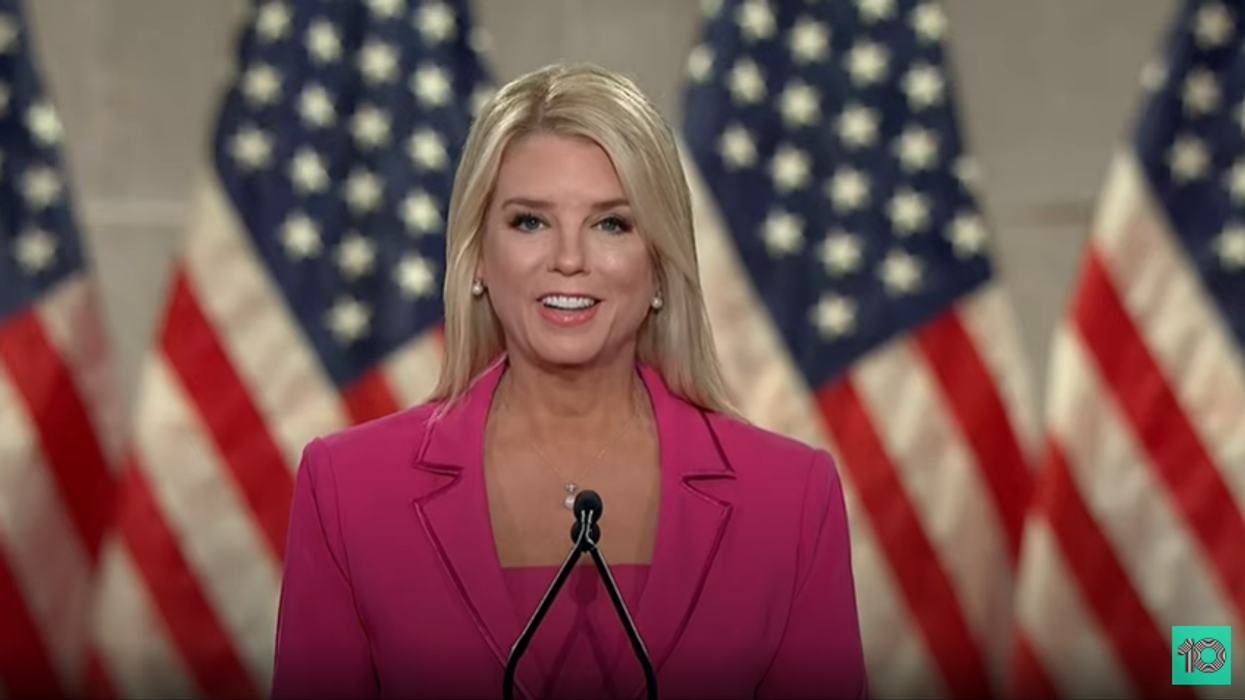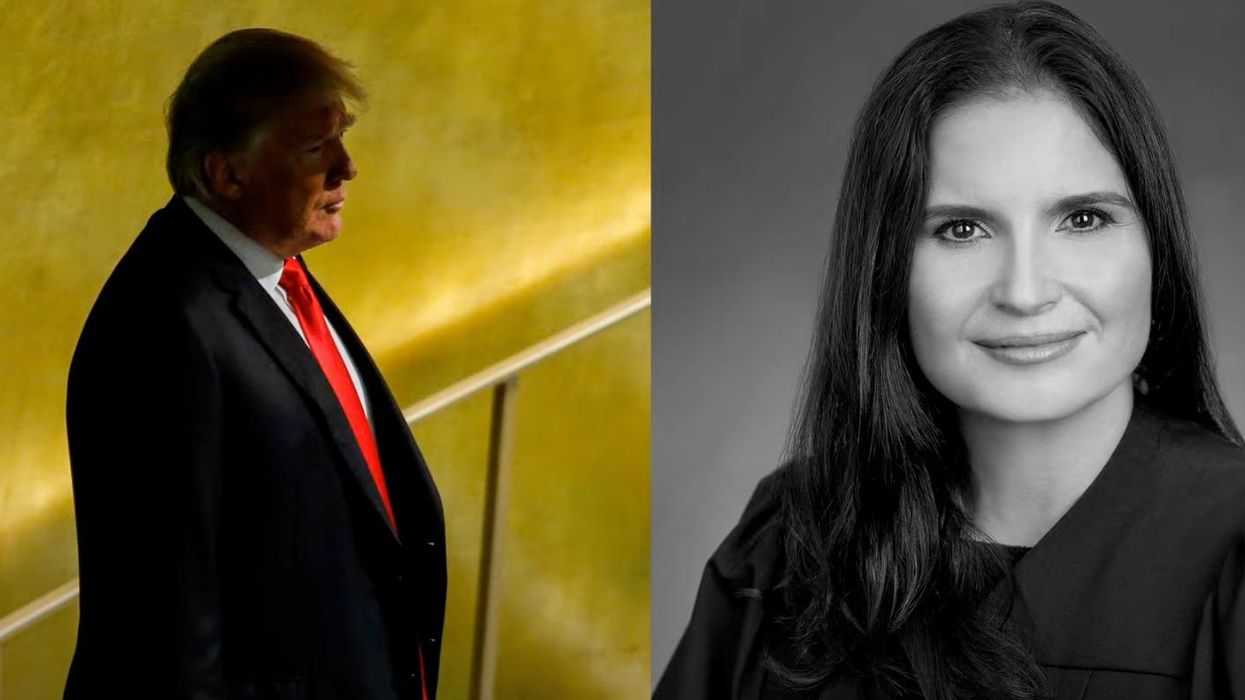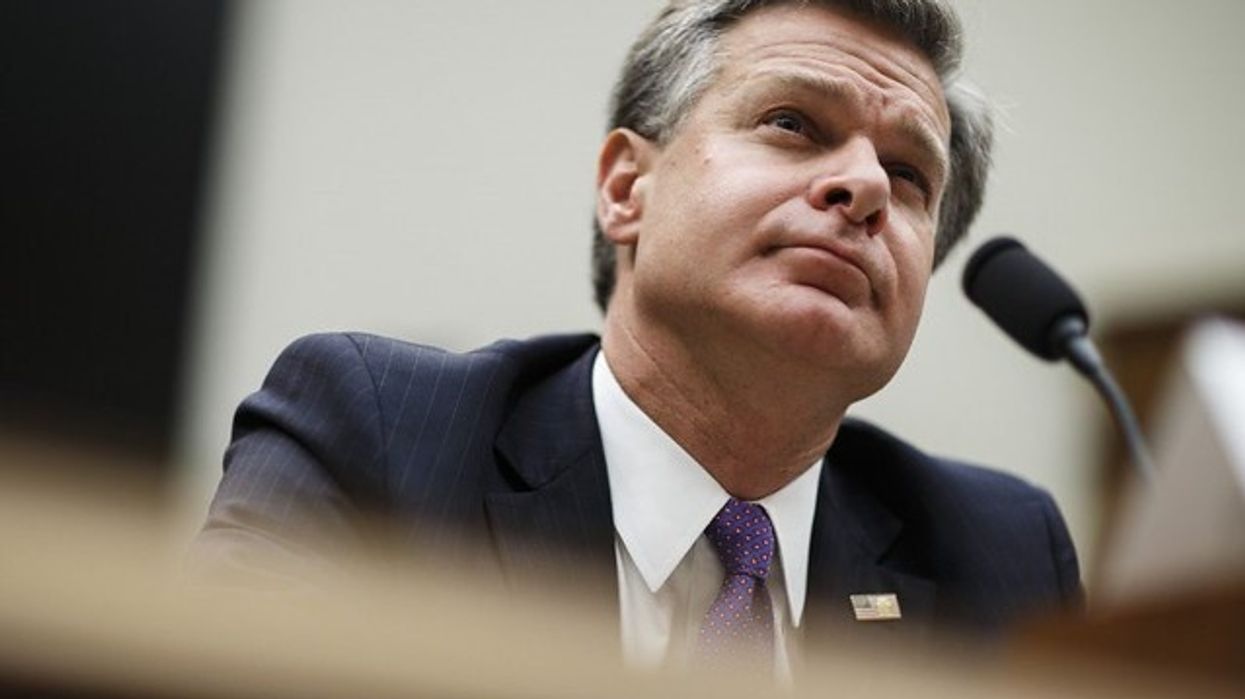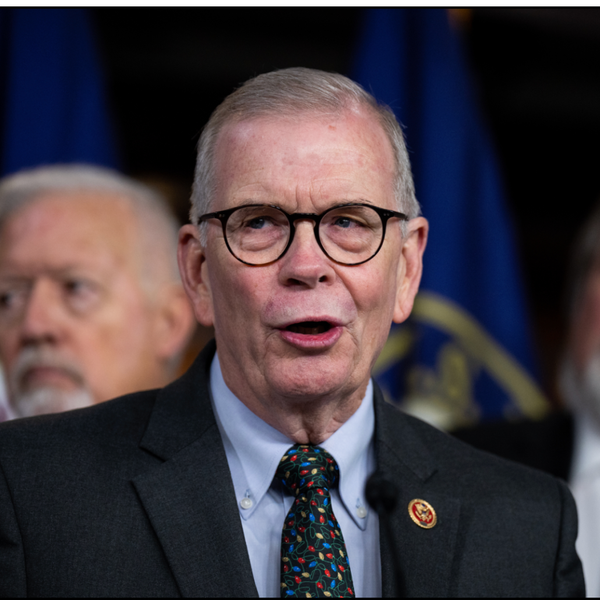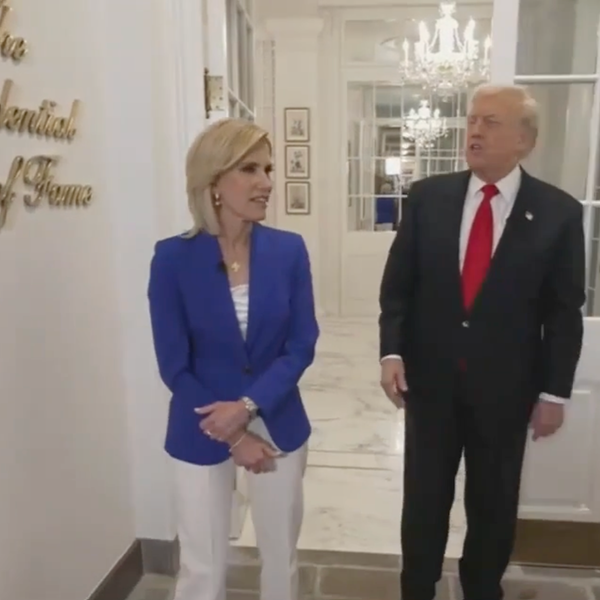Pam Bondi Shows How It's Not Done
In her press conference Friday announcing the unsealing of Department of Justice criminal charges against Kilmar Abrego Garcia, Attorney General Pam Bondi put on a clinic—in how to make such announcements improperly.
Bondi overreached grotesquely, in ways that likely violated DOJ, bar association, and federal guidelines, and possibly the U.S. Constitution as well. In her excess of zeal, she tarred Abrego Garcia with external allegations and may well have undermined the prospects for conviction.
This is not Bondi’s first flagrant departure from appropriate conduct in informing the public about DOJ charges. It’s become her M.O. to throw around inflammatory charges against defendants combined with fulsome and legally irrelevant praise of President Trump.
She should, and likely does, know better. In other times, the Department’s disciplinary processes would come down hard on her. But taking a page from her patron, she has also neutered norms and rules designed to rein in abuses. For former DOJ staffers, it’s stunning and deeply disheartening to see the abuses come from the very top, and to witness a kind of bloodthirst for conviction replace the Department’s deep institutional allegiance to the presumption of innocence.
The presumption of innocence is a cornerstone not just of American law but of nearly all evolved criminal justice systems. It is a counterweight to the enormous power of the state and a bulwark against the prospect that the government could use the criminal law to punish opponents and suppress dissent. The idea is encapsulated in the famous maxim of the foundational legal expositor William Blackstone: “It is better that ten guilty persons escape than that one innocent suffer.”
The presumption of innocence requires that prosecutors present their evidence in a court of law according to rules of evidence and other legal safeguards, including the burden of proving guilt beyond a reasonable doubt. It follows that in publicly announcing charges against a defendant—which are not evidence but mere allegations—a prosecutor must restrict herself to the information set out in the grand jury indictment or other charging document, and must scrupulously characterize that information as government contentions, not proof.
That limitation, which is a matter of second nature to a seasoned prosecutor, gives rise to several independent strictures. Violating them potentially carries administrative, disciplinary, judicial, and even criminal penalties.
Among the most serious is the prohibition in the Federal Rules of Criminal Procedure (formally enacted by the Supreme Court with congressional oversight) on public disclosure of “matters occurring before the grand jury.” Once a grand jury has returned an indictment, the set of allegations in that document becomes public, and so a prosecutor may disclose those allegations. But by the same token, she may disclose only those allegations and must make it clear that they are simply allegations and that a defendant retains the presumption of innocence.
Then there are Department of Justice restrictions on media statements in the Justice Manual. These specify, among other things, that a prosecutor may only confirm basic public facts, such as court dates, and can never offer public statements about the strength of the evidence, character of the accused, or likelihood of conviction.
Departures from these DOJ guidelines are subject to discipline by the Department’s Office of Professional Responsibility, which investigates misconduct and makes findings that can lead to various recommended sanctions, including termination.
There are also separate ethical rules administered by state bar authorities that forbid lawyers from making out-of-court statements that present a substantial likelihood of materially prejudicing a proceeding. Those are typically part of state-specific regulatory systems of ethical restrictions. In Florida, where Attorney General Bondi holds her bar license, these include a special requirement that a “Florida prosecutor must refrain from making statements that ‘heighten public condemnation of the accused’ unless necessary to inform the public and serve a legitimate law enforcement purpose.”
Finally, the prohibition on public commentary outside the four corners of the indictment has a constitutional dimension. Courts have suppressed evidence and even reversed criminal convictions for misconduct that violates a defendant’s right to the presumption of innocence—for example, improperly influencing the jury pool.
The transgression, and thus the prospect of court sanction, is greater when the inflammatory statement comes from a high-level government official. As the Fifth Circuit Court of Appeals put it in a case growing out of Hurricane Katrina: “When statements come from high-level government officials such as a United States Attorney, they are more likely to be taken seriously by the press and the public and thus more likely to influence public opinion—and potentially, the jury pool.”
The bottom line, ingrained in the mindset of experienced prosecutors, is straightforward: when announcing criminal charges, stick scrupulously to the four corners of the indictment; emphasize that they are allegations and the defendant is presumed innocent; and never malign the defendant with extraneous incendiary characterizations—for example, by asserting, as AG Bondi did on Fox News in discussing the charges against state court judge Hannah Duggan, that she must be “deranged.”
In this case, the indictment itself—and in particular the conspiracy charge—gave Bondi plenty of material to paint Abrego Garcia in the most sinister terms.
The indictment has a central story, and it's one we've known about for some time. In 2022, Abrego Garcia was stopped by state troopers in Tennessee. He was driving a Suburban and there were nine other passengers, all Hispanic males, in the car with him. He told police that he was transporting the nine from one job site to another. The officers, who recorded the episode on their body cameras, suspected that he might have been transporting undocumented aliens, but they opted to let him go with a warning about an expired license.
That story is the dramatic centerpiece—really the only detailed drama—in the indictment. The rest of the document is cursory and elliptical. But it seeks to paint a picture of Abrego Garcia's criminal conduct that goes very far beyond—in time and kinds of crimes—the traffic stop.
The key is the government’s use of a conspiracy charge. Conspiracy law is a very powerful tool for prosecutors because it provides for liability among all conspirators for the criminal conduct of each of them. It does, however, require the government to prove beyond a reasonable doubt that the defendant agreed to participate in the conspiracy.
Thus, perhaps the key allegation in the whole indictment is in paragraphs 9–10, alleging that Abrego Garcia joined a 10-year conspiracy (from about 2016 to about 2025) to transport aliens within the United States.
That is the linchpin that lets the government load up the indictment with allegations of conduct from unidentified conspirators (CC-1 to CC-6 in the indictment). Some of the allegations have nothing to do with Abrego Garcia; others have nothing to do with the identified goal of the conspiracy.
Paragraph 26 alleges that CC-6 was involved in the killing of more than 50 migrants when the trailer they were in overturned in Mexico. Paragraphs 19–20 detail the money laundering part of the operation by CCs 3, 4, and 5. There is no mention of Abrego Garcia.
Use of conspiracy law to expand a defendant’s liability is fair game. But it depends on proof beyond a reasonable doubt that Abrego Garcia agreed to join the conspiracy. That may prove tricky. The indictment just states—without elaboration—that Abrego Garcia agreed with CC-1 to “work together to transport undocumented aliens for profit and private financial gain.”
The story, however, looks more complicated than that. According to news reports, CC-1 is a man named Jose Hernandez-Reyes, who is serving a 30-month sentence in Alabama for transporting undocumented migrants. He has been granted limited immunity to cooperate against Abrego Garcia. He supposedly told federal officers who visited him in April that he ran a Baltimore-based taxi service for transporting migrants and that he hired Abrego Garcia “on multiple occasions” to do the driving.
That hardly seems like a clear demonstration that Abrego Garcia agreed to join the overall criminal enterprise. It certainly leaves room for argument that he's more like a hired hand who helped out on multiple occasions.
We know that the chief of the criminal division in the Nashville U.S. Attorney's office where the case was brought resigned over the decision to charge Abrego Garcia. He was a career prosecutor who had served for 15 years. That sort of resignation is, first, incredibly rare—or was before the Bondi era—and second, an indication of something possibly very abnormal in the case approval process. Perhaps it was the decision to treat Abrego Garcia as a mastermind leader of the conspiracy with Hernandez-Reyes, rather than an occasional driver.
The bottom line, though, is that the concrete and detailed story of the Tennessee stop stands very far apart from the balance of the indictment, which is fairly flimsy and conclusory. It’s the big leg up of the conspiracy charge that enables the government to use the traffic stop to portray Abrego Garcia as a central player in a longstanding scheme of unlawful transportation of migrants—with stray allegations of gun-running, drugs, and sexual abuse thrown in.
Bondi was asked at the press conference why, since the grand jury had uncovered all the additional information involving guns, drugs, and sexual assault, the government didn’t charge Abrego Garcia with those crimes. This was her complete response: “We were clear to say that he is charged with very serious charges of alien smuggling, and again, there were children involved in that. You know—human trafficking, not only in our country but in our world, is very, very real. It’s very dangerous.”
In his famous speech, “The Federal Prosecutor,” Attorney General (and later Associate Justice) Robert Jackson wrote, “While the prosecutor at his best is one of the most beneficent forces in our society, when he acts from malice or other base motives, he is one of the worst. The federal prosecutor can strike hard blows, but he is not at liberty to strike foul ones.”
The conspiracy charges against Abrego Garcia strike a hard blow—though, as noted, they may result in problems of proof for the prosecution. But the Attorney General’s remarks at her triumphant, pugnacious press conference repeatedly struck foul ones.
For starters, Bondi leveled wildly inflammatory charges against Abrego Garcia that strayed far from the four corners of the indictment. She asserted that the grand jury found that Abrego Garcia was a full-time smuggler of migrants, not a contractor (“They found that this was his full-time job.”). She said that he made over 100 trips and transported over 1,000 migrants. (Notice these allegations seem to contradict the account of Hernandez-Reyes, who told the feds that Abrego Garcia had driven loads of migrants “on multiple occasions.”) She told the press that the grand jury found that Abrego Garcia solicited nude photographs and videos of minors. She alleged that he had played a role in the murder of a rival gang member’s mother.
The indictment includes not a word about any of these incendiary allegations that indeed do make Abrego Garcia seem like an incorrigible criminal and one of the “worst of the worst,” as Trump has put it. In fact, Bondi’s repeated assertions about what the grand jury “found” are bizarre. Grand juries don’t submit ancillary findings in support of their indictments. All their allegations are contained within the indictment (which, typically, prosecutors draft).
And to the extent Bondi was relying on evidence that the grand jury heard but that did not wind up in the indictment, she would be revealing confidential grand jury information in violation of the Federal Rules of Criminal Procedure. That is the sort of serious transgression that typically results in discipline of the attorney and potential dismissal of the case.
Bondi further peppered her comments with chest-thumping and hammy lines that again just have no place in a media briefing on a federal indictment. She dramatically proclaimed that Abrego Garcia had “traded the innocence of minor children for profit,” whatever that means. When asked what had changed since authorities declined to charge Abrego Garcia for the 2022 traffic stop, she answered, “What has changed since then is Donald Trump is now President of the United States and our borders are again secure,” which manages to be improperly political, nonresponsive, and bananas all at once.
She then asserted that the police work on the Abrego Garcia case had “stopped this international smuggling ring,” but Hernandez-Reyes has been in federal custody since April 8, after being picked up by Border Patrol agents on an unrelated charge. She came back repeatedly to the “disturbing” fact that there were children involved, and detoured to an unrelated case in which MS-13 allegedly groomed young children to be gang members. She said that Abrego Garcia not only had joined the conspiracy but played a “significant” role in it.
Bondi has regularly violated legal, ethical, and internal requirements in her public remarks about federal charges. But the Abrego Garcia press conference reads like an issue-spotter ethics exam for young prosecutors. Virtually every sentence contains one or more improprieties. Any potential juror that heard it, not to mention the public as a whole, would have to have been left with a sinister picture of Abrego Garcia as one of the “worst of the worst” that seems flatly discordant with the available evidence and bears little relation to the actual allegations in the indictment. It’s a truly disgraceful performance.
It’s not hard to discern Bondi’s motivation for splattering mud all over Abrego Garcia. He was the first migrant whom the Trump administration had to admit it had deported by mistake. His case has been the hottest flashpoint in a series of controversial deportations, and he has become the poster child for the Administration’s fecklessness and indifference to its own constitutional violations.
When faced with court orders to return him to the United States, the administration trotted out a series of lousy legal arguments and implausible factual accounts to try to evade their constitutional responsibility to bring him back. But they were only digging an ever-deeper hole for themselves, both in the courts and in public opinion, and their refusal to facilitate his return was becoming untenable.
The government insisted that it couldn’t and wouldn’t bring Abrego Garcia home so many times, that finally throwing in the towel was an embarrassment. The criminal charges are a face-saving measure, and the more they can paint Abrego Garcia as a savage monster, the more they can deflect attention from their own lawlessness and portray Trump as a strongman savior.
If this case goes to trial, I think it's likely that the government’s proof will not match its allegations, starting with Abrego Garcia’s supposed joining of the conspiracy. The cross-examinations of CC-1 and CC-2 figure to be bruising. The defense also has a strong story to tell of vindictive and politicized prosecution, and various ways to make hay of Bondi’s improper public comments.
For those reasons, I think the administration is likely to play hardball and bring all leverage it can to induce Abrego Garcia to plead guilty, probably to the one substantive count based on the 2022 traffic stop. They weren’t able to disappear him permanently into CECOT, but keeping his story—which is mainly a story of governmental misconduct and malice—from coming out would be the next best thing for the Administration. It would prevent Abrego Garcia and the justice system from turning the mirror on the Administration’s skein of overreach, arrogance, and evasion since March 15, when they shipped him to El Salvador by mistake. They would be able to bury the whole ugly mess, keep the most important parts of the story from coming to light, and preempt any efforts to hold the government accountable. That’s a foul blow to democracy.
Harry Litman is a former United States Attorney and the executive producer and host of the Talking Feds podcast. He has taught law at UCLA, Berkeley, and Georgetown and served as a deputy assistant attorney general in the Clinton Administration. Please consider subscribing to Talking Feds on Substack.
Reprinted with permission from Substack.

